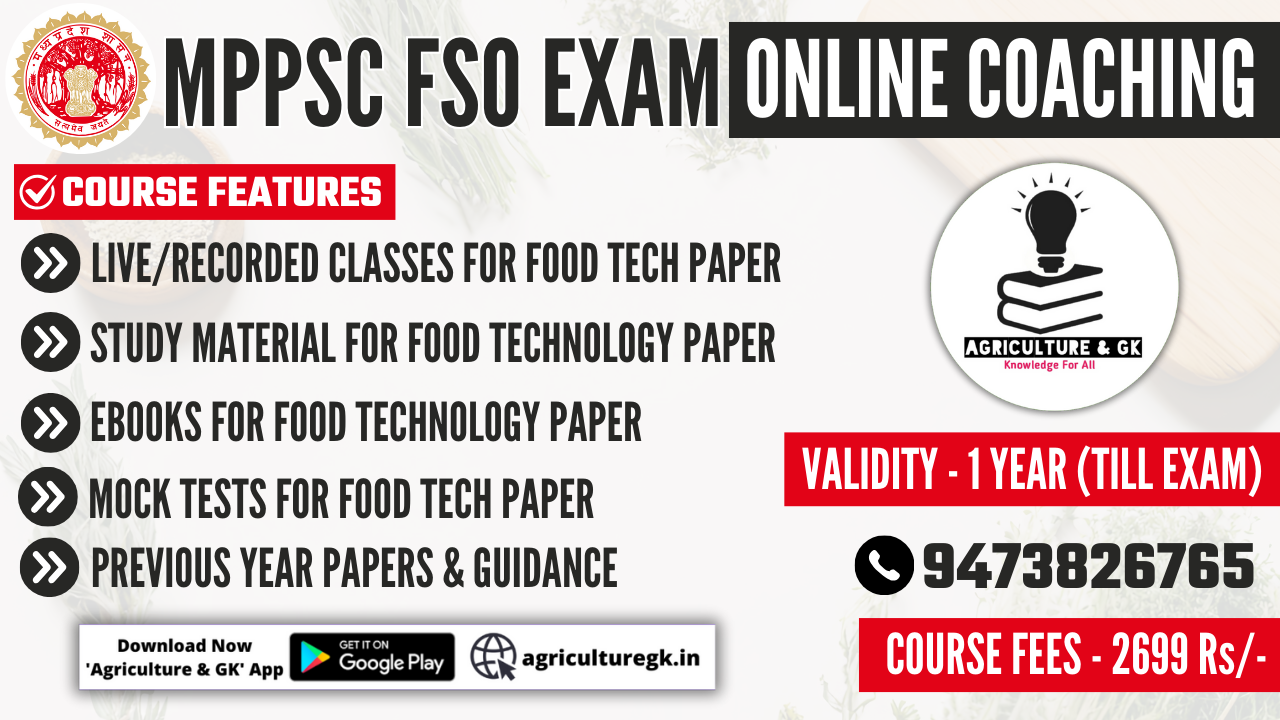MPPSC FSO Food Safety Officer Exam Online Coaching
Validity : 12 Months
- Live & Recorded Classes
- Study Material & e-Books
- Full Length Test Series
- Previous Years Papers
- Discussion Group For Current Affairs & Information

₹2,699 ₹15,00083% off
Description
If you're gearing up for Madhya Pradesh Public Service Commission (MPPSC) Food Safety Officer FSO Exam, this comprehensive batch is a must-have. It covers Food Technology Paper, making it ideal for aspirants preparing for the Madhya Pradesh Public Service Commission (MPPSC) Food Safety Officer FSO Exam.
Important Features of MPPSC Food Safety Officer Online Course are:
- For admission call us at 9473826765.
- 300+ Hours Video Lessons covering the entire Food Technology syllabus of MPPSC Food Safety Officer Exam.
- Study notes in form of PDF for easy learning.
- 20+ Difficulty Based Mock Tests for MPPSC Food Safety Officer Exam comprising of Questions divided into Easy, Moderate and High Levels. This will help you prepare for MPPSC Food Safety Officer Exam in a systematic way.
- Previous Years Solved Papers.
- Enroll in this Batch, Limited Seats available.
- Recorded Videos available 24/7 for quick Revision.
- Solve Unlimited doubts with experts.
- Get Preparation tips from the experts & Learn Time Management.
- Interview Guidance.
Why Choose MPPSC Food Safety Officer Online Classes from “Agriculture & GK”?
- For MPPSC Food Safety Officer Exam the entire syllabus of Food Technology will be covered through Video Lessons & Discussions.
- We are giving maximum selections in FSSAI & State Food Safety Officer Exams.
- All the Video lessons are short-crisp and to-the-point with relevant study content.
- All video Lessons are followed by concept clearing questions for reinforcement of learning and also helps to check your progress.
- Short and crisp MPPSC Food Safety Officer Exam study notes in PDF format for easy learning and quick revision.
- Apart from study content; Guidance, Tips, and Preparation Strategy from Subject Experts at each stage is also provided.
- Live Online Classes for MPPSC Food Safety Officer Exam with Subject Experts /Program mentors are conducted for Doubt Clarification.
MP FSO Exam Pattern
The MP FSO examination comprises a single written test followed by an interview. The details are as follows.
| MP FSO Exam Pattern | |||
| Part | No. of Questions | Total marks | Time |
| Part A (General Studies) | 50 | 100 | 3 Hours |
| Part B (Food Science and Technology) | 100 | 300 | |
| Total | 150 | 450 | 3 Hours |
| Interview | 50 | ||
| Overall Total | 500 | ||
MPPSC FSO Syllabus
The Madhya Pradesh Public Service Commission (MPPSC) has released the detailed syllabus for the Food Safety Officer (FSO) Examination. The syllabus is divided into multiple units, each covering specific topics essential for the role. Below is a structured table summarizing the syllabus:
Section A: General Studies
Unit 1: History of Madhya Pradesh
Unit 2: Geography of Madhya Pradesh
Unit 3: Politics and Economy of Madhya Pradesh
Unit 4: Tribes, Heritage, and Culture of Madhya Pradesh
Unit 5: Contemporary Events and ICT
|
Units |
Topics |
|
UNIT-01- History of Madhya Fradesh |
Ancient Histöry of Madhya Pradesh -Prehistoric Period, Protohistoric Period. Medieval History of Madhya Pradesh Modern History of Madhya Pradesh Freedom Movement in Madhya Pradesh.. Tribal History and Tribal Literature of Madhya Pradesh |
|
UNIT-02 :-Geography of Madhya Pradesh |
Geographical location and extent of the state, major Rivers, mountains. Climate: Seasons, Soils; Temperature, Rainfall, Forest types and Forest produce. Agriculture: Major crops, Sources of irrigation, Irrigation projects, Thermal power projects, Non-conventional energy sources, Major Minerals. •Population size, Growth and Uiteracy; Transportation, Food processing: industries. |
|
UNIT-03:- Polities and Economy of Madhya Pradesh |
Politics of Madhya Pradesh- Governor, Chief Minister, Cabinet, Vidhan Sabha, High Court, Lokayukta. State Secretariat, Chief Secretary, Divisional Commissioner, Police Commissioner. District Administration, Urban Administration, Local Self Govemment, Parichayati Raj Institutions. State Election Commission, State Information Commission, State Scheduled Castès Commission, State Scheduled Tribes Commission, State Backward Classes Commission, State Commission for Women. Schedule Caste and Schedule Tribe Prevention of Atroçities Act, 1989; Panchayats Extension to Schedule Areas (PESA) Act, 1996; Environment Protéction Act, 1986; Economy of Madhya Pradesh- Overview of the Economy of Madhya. Pradesh. Status of Agriculture and Rural Development in Madhya Pradesh. Development of Industrial and Infrastructural Framework in Madhya Pradesh. • Status of Education, Health and Skill Development in Madhya Pradesh. Status of Madhya Pradesh in Sustainable Development Goals, Ease of Doing Business |
|
UNIT-04: Tribes of Madhya Pradesh: Heritage, Folk Culture and Folk Literature |
The geographical spread of tribes in Madhya Pradesh and constitutional provisions related to tribes. Significant tribes of Madhya Pradesh and Particularly Vulnerable Tribal Groups (PVTGs). Tribal welfare programs. Tribal culture of Madhya Pradesh: Traditions, special arts, festivals, celebrations, language, dialects and litreture, Madhya Pradesh tribal's contribution to the freedom struggle of India and iconic tribal personalities of state. ribal museums, publications, etc. Folk culture and folk literature of Madhya Pradesh. |
|
UNIT -5:- Important Contemporary Events of International, National and Madhya Pradesh and Information and Communication Technology |
Important International and National Contemporary events. Important Contemporary Events and Major Public Welfare Schemes of Madhya Pradesh. Prominent Personalities and Important Places of Madhya Pradesh. Computers, Information & Communication Technology, E-Governance. Basic knowledge of Artificial Intelligence (AI), Machine Learning, Cloud Computing, Data Science and the Internet of Things. |
Section B: Food Science and Technology
Unit 1: Introduction to Basic Food Science
Unit 2: Food Microbiology
Unit 3: Food and Nutrition
Unit 4: Food Preservation, Packaging, and Storage
Unit 5: Indian Farming System
Unit 6: Food Safety, Quality Control, Hygiene, and Standards
Unit 7: Integrated Agriculture Production Technology
Unit 8: Animal Product Processing
Unit 9: Food Processing Technology
Unit 10: Food Laws, Regulations, Certification & Development Schemes
| Unit | Topics |
| Unit 1: Introduction to Basic Food Science |
|
| Unit 2: Food Microbiology |
|
| Unit 3: Food and Nutrition |
|
| Unit 4: Food Preservation, Packaging and Storage |
|
| Unit 5: Indian Farming System |
|
| Unit 6: Food Safety, Quality Control, Hygiene & Standard |
|
| Unit 7: Integrated Agriculture Production Technology |
|
| Unit 8: Animal Product Processing |
|
| Unit 9: Food Processing Technology |
|
| Unit 10: Food Laws, Regulation, Certification and Development Schemes |
|
MPPSC FSO career growth
|
Designation |
Experience Required |
|
Food Safety Officer (FSO) |
Entry-Level |
|
Senior Food Safety Officer |
3-5 years of experience |
|
Assistant Commissioner (Food Safety) |
Promotion-based |
|
Deputy Commissioner (Food Safety) |
Higher administrative role |
Demo Videos












